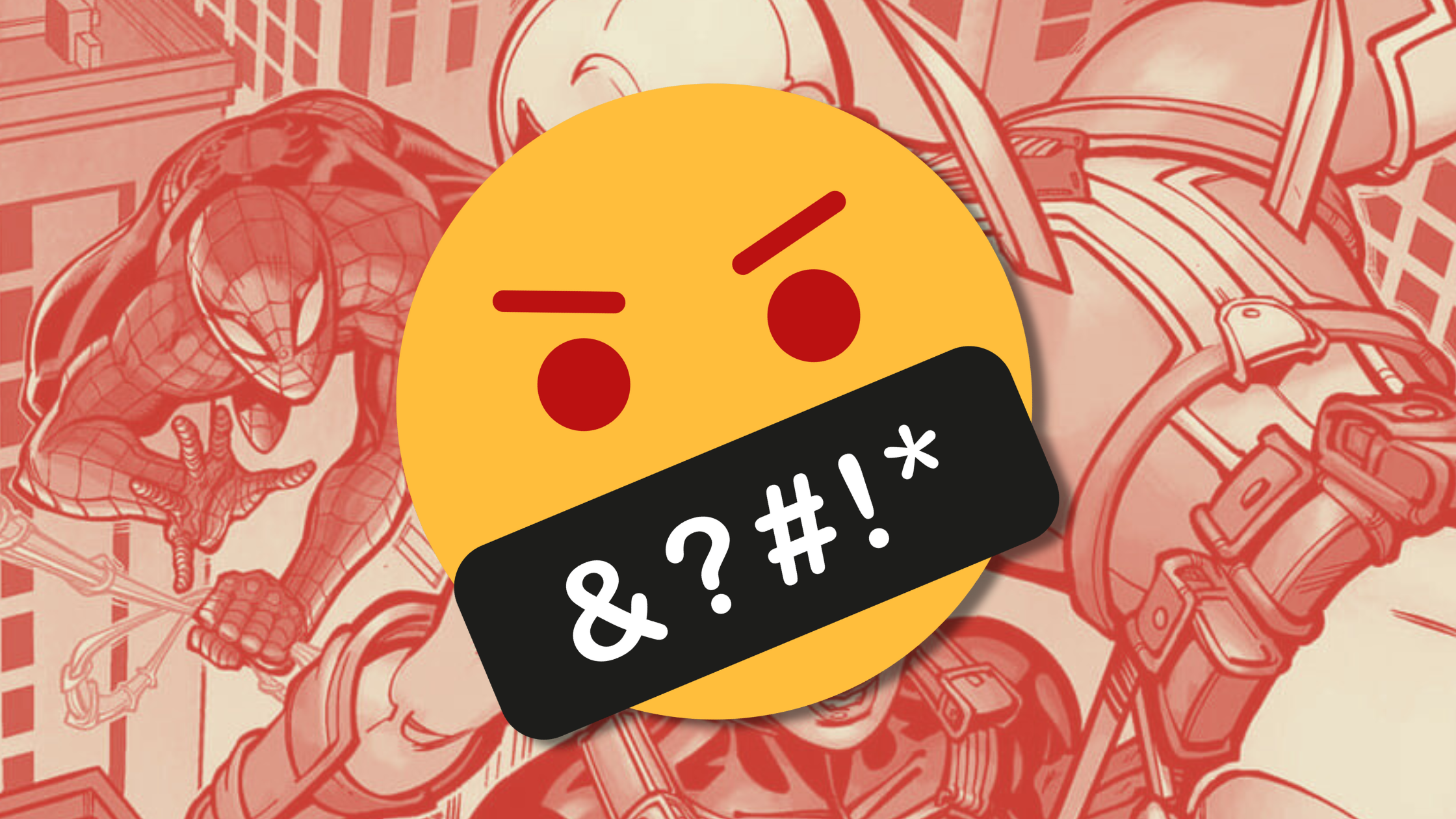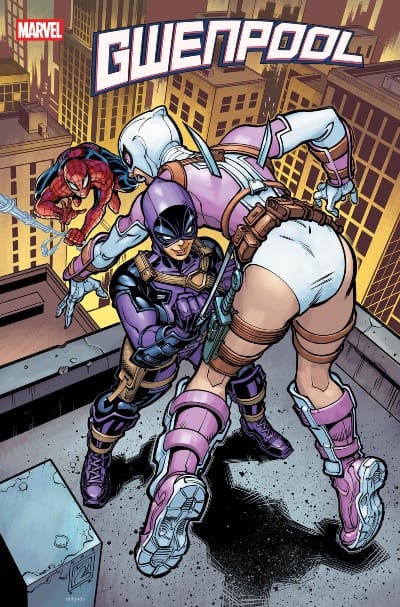Dealing with strong responses to your art

“You should be ashamed of yourself.”
That was the closing line of an email I received the day this cover debuted online:

As soon as I saw the issue's solicit, I knew there would be a reaction, and I wasn’t wrong. Angry emails started to arrive almost immediately. Of course, it’s nothing I haven’t seen before, especially in the early days of Star Wars: The High Republic. And I know other creators receive similar missives as well. Lots of them. And yet we rarely talk about how it feels to receive something like this – or how to respond.
Here's how the email started:
I want to make something very clear to you right now, sir. Even if this is a fake out, it has seriously angered me and put me even more off what I see as an offensive, mean-spirited, and hateful story to begin with. If it is not a fake out, then you have done yourself no favours in regards to my opinion of you as a writer. This very cover on its own disgusts me. To see a character I love being murdered by a cheap imitation, born of cynicism, spite and frankly tired, worn out, awful ideas, is only serving to incense me.
I want you to understand, if you kill Gwenpool, the REAL Gwenpool and replace her with this frankly garbage version of her that belongs back in the 90s dark age trash bin where she spawned from... you will be responsible for doing something no one else has done before. You will be the reason I never pick up another Marvel Comic again. Ever. Perhaps not even another comic again at this rate. You will have killed the character that convinced me this medium still had value... all so this frankly trash version of her can overtake her.
And on it went.
The message that stuck with me
This one got to me – probably as intended. It was also the last email I read that day, which meant it was the one that lingered, bouncing around my head even when I went to bed and turned off the lights.
And, like it or not, messages like this are part of the job, especially if you choose to be on social media. As creators, we want people to respond to our art. To form a connection. Often, we crave it. And there's an undeniable dopamine hit when you receive praise, someone telling you how much your work means to them or how much they enjoyed an issue. Of course, there is. We're only human.
But if you want and expect the validation of praise, you should also prepare for criticism. It's going to happen, whether you like it or not. There's no way you can please everyone. Nor should you try to. Life just doesn't work like that.
It's part of the creative existence. If you make yourself open to communication, you will receive messages you don't like. Some will be uncomfortable. Some will be abusive.
So how do you deal with them?
Navigating strong reactions
First, you need to remember that you can’t control the response to your art. In fact, in this instance, there was so much I couldn’t control about that day. I hadn’t seen the cover before it went live. I’d had no part in briefing the artist. I was introduced to it at the exact same time as everyone else. It's a reminder that once you've worked on something and put it out there, it's out of your hands. Some people will love it. Some will hate it. Most won't have an opinion one way or another.
So, ask yourself a couple of questions:
- Are you proud of the work?
Am I proud of my work on Gwenpool so far? Yes, I am. It's an opportunity I've relished and one that has ticked off so many items on my bucket list. It's also one I’ve worked hard on, putting everything I could into the development process and the scripting, taking as much care as possible when reviewing the art. Have I learned lessons from doing it? Again, yes. Nothing is ever perfect (a lesson I struggle with over and over again), but I feel I've done everything to the best of my ability.
So, question two:
- Are you sensitive to the feelings of fans?
Goodness me, yes! I get how important these stories are to fans because, at the end of the day, I'm a fan too! That's why I got into this business, why these stories and characters have been with me all my life. I often joke that my to-do list hasn't changed since I was ten years old: monsters, wizards and superheroes. And now it's my job! I'm incredibly fortunate and have worked hard to get here.
But it means I get it. I know how important a series or a character or a creator can be to you, how much you project onto them and how much you take from your relationship with their adventures. How much it can help you define your identity. I get the joy and the excitement... and I also get the frustration when something happens that you don't like, that doesn't fit what you think that series, character or creator should be. What it means to you.
Understanding fan frustration
There's a lot written about parasocial relationships – the emotional bond you can feel to a public figure or character with no real interaction between them – and there's nothing wrong with them in themselves. They can be healthy, a way to work something out about yourself, to take inspiration and become the person you want to be.
They're also incredibly powerful.
I get why fans can lash out. I understand why people don't like things when things change. Why it can feel personal.
And that connection can also mean that, as a fan, I sometimes get angry about a decision, flinging up my hands to shout 'who asked for that?' It happened on the day that the news of the new Gwenpool series dropped, especially with the return of Gwen Stacy. 'NO ONE ASKED FOR THIS' shouted social posts... but the truth is that yeah, someone did. The editor that commissioned me. The publisher of the book.
This is where it gets even more complicated. I'm a poacher turned gamekeeper. A fan who has been given the opportunity to write the characters he loves. In this case, I was asked to do a job and so went away and thought about it, asking if I could find a story I could tell within the guardrails of the commission. And the answer was yes, there was something I could work with, something that I thought I could attempt while both respecting what's gone before and trying something new. Is that arrogance on my part? I hope not. As a creator, all you can do is control your part in the process. The creation of the story. How you work with your teammates. And how you represent the series to the wider world.
Does that mean that messages like this don’t hurt? That they don’t rankle? Of course not.
Often on social media, I shrug things off. Make a glib comment about having developed a skin thicker than a Trandoshan. Is that true? Some days, yeah, but those days are rare. I don’t think that’s a bad thing. In the past, I’ve been guilty of shutting those feelings down. Of locking them away. Creatives are supposed to feel. They need to feel. It’s part of our superpower. Our vulnerability is our strength and our means to make better art. We need to constantly notice how we’re feeling, acknowledge it for what it is and then file it away to use in our art to come. Our feelings, good and bad, are a source of inspiration.
So, what do you do after you've answered those questions? How do you respond?
To reply or not reply? That is the question
The truth is you don't have to. Not reading the comments or replying to angry mail is an absolutely valid choice, especially if the messages are abusive or threatening. Boundaries are important and should be used in whatever way you see fit.
You can also give yourself permission to adjust those boundaries depending on the message or situation. It's by no means necessary, but can be helpful from time to time.
In this case, I chose to respond to this message. I know, I know. I can almost hear people shouting at the screen. Why would I do that? The truth is that I didn't have to respond and certainly don't always, but there was something in the message that got to me, that sense that I knew what it's like to feels so strongly about a character. How important it can be to feel like you've been heard. But I was also wary, afraid that it would escalate, that my reply would prompt another, more abusive response. So, after much rewriting, this is what I came up with:
Thank you for taking the time to write.
Stories, especially those involving characters we love, stir strong emotions, and it’s clear how much Gwenpool means to you.
While I can’t reveal what’s ahead, I can assure you that the story has been created from a place of respect, both for Gwen and her fans. Every hero is someone’s favourite. I get that because I’m a fan too, and I understand how frustrating it can be to see a cover or teaser that doesn’t feel right to you.
I appreciate you sharing your connection to Gwenpool, and I hope that once the full story is told, you’ll see what we’re aiming for.
Wishing you all the best,
Cavan
Even then, I made sure there was another boundary in me, sending the message via my assistant, who had forwarded the original email to me. I understand that not everyone has someone who can do this for them, but in this case, it made me more comfortable when replying, placing a little distance there.
Did it prompt a response? Yes. Was the reply equally aggressive? In many ways, yes. And it was also a little more demanding, saying:
If you really want to convince Gwenpool fans that we are not getting screwed over, that you care about the character as more than just fodder for a shock moment, then you’ll actually address those concerns. Do an AMA, an interview, put out a blogpost, something about Gwenpool as a character, the real one, that you admire and like.
If you actually want to put these fears to rest, you’ll come out into the open and speak to fans about the situation. Maybe you won’t dispel all fears and doubts, but at least you’d show you care. And it would prove to people like myself that Gwenpool actually means something to you beyond a job from Marvel and a chance to play around in their sandbox. That you haven’t just been hired on to pull the trigger on a character we love.
This is another point to take from all this. In this case, I have done all of these things or am about to. I’ve been talking about the series on my Bluesky account and here in my newsletter and blog. I’ve been communicating with existing Gwenpool fans and have set up interviews and an AMA. The writer of the email probably hadn't seen any of that, nor could they have known about the promotion I'd planned for the next few weeks. Again, that's out of my control. All I can do is choose the platforms I interact with and how much time and energy I have for the conversations. As with all these things, the important part of the job is the work. I'm a writer. Therefore, I need to write, to tell the best stories I can before releasing them into the wild. Beyond that, there's no one-size-fits-all answer when dealing with interactions, and what works for me won't work for you. But I think it's important to talk about these things and share our experiences, not to publicly shame anyone, but to develop our own ways of coping with a situation which is as old as the hills, but the internet has intensified beyond belief.

